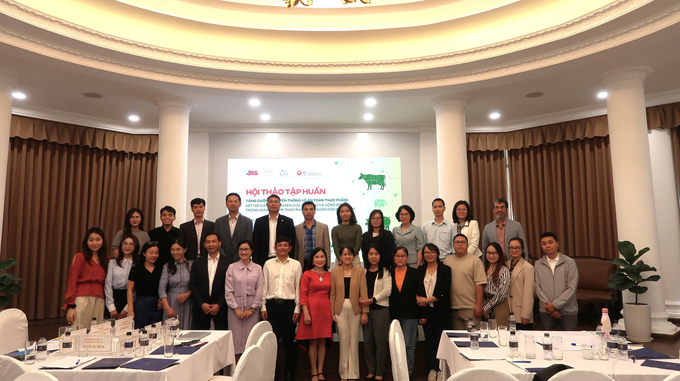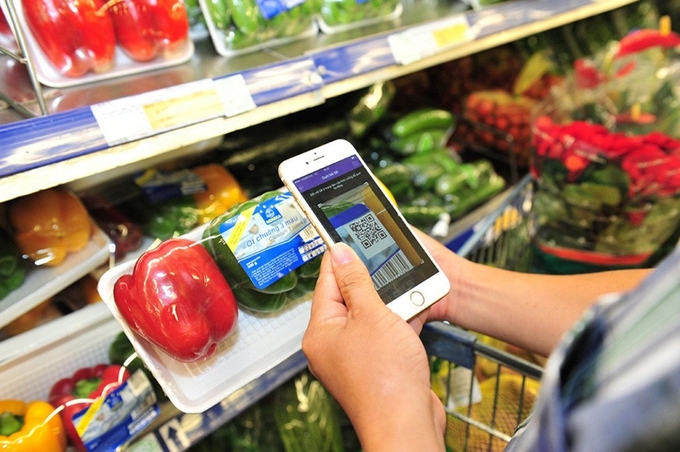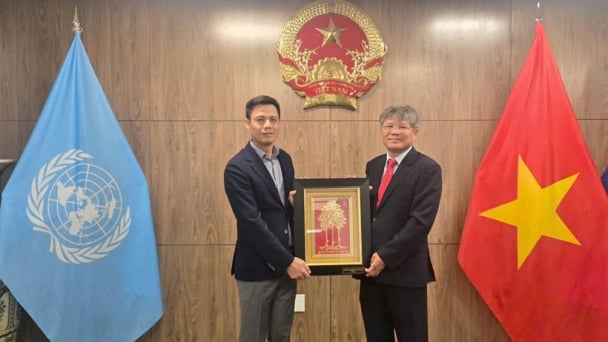May 22, 2025 | 12:43 GMT +7
May 22, 2025 | 12:43 GMT +7
Hotline: 0913.378.918
May 22, 2025 | 12:43 GMT +7
Hotline: 0913.378.918

The training program emphasizes the importance of food safety in the food supply chain, while also providing effective communication strategies. Photo: ILRI.
In response to the increasing concerns about food safety in Vietnam, the Vietnam Agricultural Newspaper, in collaboration with the International Livestock Research Institute (ILRI), organized a training seminar with the theme "Enhancing communication on food safety: Connecting researchers, journalists and communities in the animal-origin food value chain".
According to Mr. Nguyen Ba Trinh, Deputy Head of the Dong Anh Market Management Board in Hanoi, with the rapid development of online shopping trends, the business operations of vendors at traditional markets are facing significant challenges.
"I regularly have to encourage the vendors to help them stay motivated and continue with their business activities. At the same time, I encourage them to produce and process clean food that meets the required food safety standards, ensuring customer satisfaction and loyalty", Mr. Trinh shared.
In order to ensure food safety for the products sold at traditional markets, in addition to promoting legal policies and regulations, the Market Management Board has worked closely with local authorities to take random samples of goods for regular testing and analysis of food quality. These results are then made public and widely communicated, providing consumers with accurate and transparent information about the products they are purchasing.
Vendors who have registered their businesses at the market are required to submit full documentation confirming the origin of their products and ensuring that they comply with food safety regulations. For those vendors who have not yet registered, the Market Management Board requires them to sign a commitment to strictly adhere to food safety rules and regulations.
The efforts to raise awareness are also being carried out extensively through the use of loudspeakers, distributing flyers, and encouraging vendors to source products with clear origins that meet food safety standards. This includes meat, vegetables, and other products provided by slaughterhouses and farms that are certified for food safety.
"Regarding hygiene in both trading and slaughtering activities, the Market Management Board regularly monitors the processes to ensure that all procedures are followed correctly according to established regulations. However, in practice, there are still many challenges. For instance, vendors begin their work early in the morning (around 3 to 4 AM) for slaughtering and onsite processing, which makes it very difficult to fully comply with the regulations. This is why it is necessary to improve awareness and understanding so that the vendors themselves take more responsibility for ensuring the safety and quality of the food they produce and sell", said Mr. Trinh.

Consumers can trace the origin of products through QR codes on the packaging. Photo: nongnghiephatech.
According to Mrs. Ha Thuy Hanh, Vice President of the Association of Farms and Agricultural Enterprises, food safety is always a top priority for businesses. In order to enhance the quality and value of food products, companies continuously make efforts to obtain food safety certifications throughout the entire process - from production and processing to the final product. However, businesses must also ensure that they renew their product certifications when they expire to guarantee that their products remain compliant with the required market standards.
From a strategic perspective, it is crucial to maintain transparency with consumers regarding the traceability of products. At the same time, businesses should work together to reduce logistics costs and diversify their product offerings. This will not only help increase the value of products but also lower their production costs. Looking ahead, the focus of production must shift towards sustainability, incorporating practices that reduce emissions, are environmentally friendly, and adapt to the impacts of climate change.
"Without ensuring proper food safety standards, products cannot be sold to consumers. Today, most consumers have significantly changed their perceptions and are increasingly inclined to choose products with clear, transparent information. Ensuring food safety has now become an essential and unavoidable need in society.
As a result, businesses must develop comprehensive and far-reaching communication strategies focused on food safety. In addition, they should create unique selling points that will build consumer trust and support for businesses that produce sustainable products. These products should be in line with not only economic and social benefits but also environmental sustainability", Mrs. Hanh said.
Dr. Ha Thuy Hanh also highlighted the crucial role of communication in raising awareness about the importance of cleanliness in food production. Specifically, people should understand that ensuring food hygiene does not necessarily require expensive or complicated methods. In fact, simple and cost-effective changes in daily habits can lead to highly effective results in maintaining food quality and safety.
One of the most straightforward and practical measures to implement is the regular cleaning of livestock pens and farming areas to prevent the buildup of harmful bacteria and pathogens. Additionally, a simple yet important step is for food handlers to wash their hands thoroughly before handling or preparing food, which significantly reduces the risk of contaminating the food with harmful bacteria. Furthermore, upgrading food processing equipment, such as replacing traditional wooden tables with stainless steel ones, makes it much easier to clean and maintain hygiene standards, thus enhancing food safety during meat processing.
Translated by Phuong Linh
![Reducing emissions from rice fields: [3] New values generated from carbon credit](https://t.ex-cdn.com/nongnghiepmoitruong.vn/608w/files/content/2025/05/19/dsc09613-144700_71-150957.jpg)
(VAN) In addition to helping safeguard the environment, the low-emission rice cultivation model also generates new opportunities for farmers by leveraging the carbon credit market.
![Ho Chi Minh city adapts to climate change: [1] Vulnerable in the whirlwind of development](https://t.ex-cdn.com/nongnghiepmoitruong.vn/608w/files/duyenht92/2025/05/19/3131-ngap-nongnghiep-163121.jpg)
(VAN) As the country's economic engine with a rapid urbanization rate, Ho Chi Minh city is facing increasingly serious consequences of climate change.

(VAN) On May 21, Minister of Agriculture and Environment Do Duc Duy worked with Mr. Olivier Brochet, Ambassador Extraordinary and Plenipotentiary of the French Republic to Vietnam.

(VAN) VRG recently conducted a visit and working trip to the United States to demonstrate its efforts in redefining the role of rubber enterprises in the global value chain.

(VAN) In 2024, over 295 million people across 53 countries and territories faced acute hunger—an increase of almost 14 million people compared to 2023, while the number of people facing catastrophic levels of hunger reached a record high.

(VAN) World Environment Day 2025 (June 5) carries the theme 'Beat Plastic Pollution' continuing to emphasize the global urgency of addressing the plastic waste crisis.

(VAN) This was the assessment shared by experts at the workshop titled 'Assessing the Role and Potential of Low-Emission Rice Production Systems in Vietnam,' held on the morning of May 19.